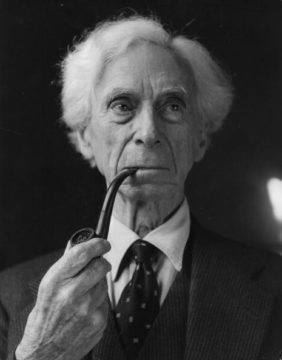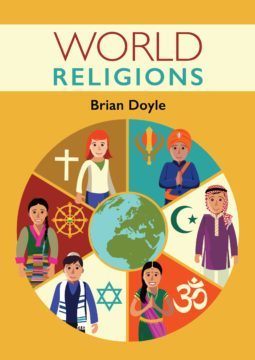by Peter Wells

One of humanity’s greatest problems is that everyone thinks they are right. We are aware, of course, that we might be wrong, because we know that on certain issues we have changed our minds, and therefore must have been wrong at least once. Nonetheless, at any given moment, we believe that we are right. The contrary would be ridiculous. We can say, if we wish, ‘I believe in the nuclear deterrent, but I might be wrong,’ but we can’t possibly say, ‘I believe in the nuclear deterrent, and I am wrong.’
Our beliefs on specific issues are part of a pattern of interconnected opinions, which we believe to be consistent, and they are related to the beliefs of members of our community, particularly our friends and colleagues. This tendency for our attitudes to be reinforced by our community has been exacerbated in recent years by social media. On the whole, we meet disappointingly few people who disagree with us, and this reduces the possibility that we might be persuaded to reconsider our views, to modify them or to compromise – which means we have fewer opportunities to grow in maturity and understanding.
In his essay ‘Trinity and Pluralism,’ Rowan Williams has an arresting observation about what people should do about the beliefs they hold – how they should regard them, and what they should do when they encounter people who hold different beliefs. He writes, of course as a Christian, but I wonder if the suggestions he makes can be applied to people of different persuasions. He proposes that
The Christian does not ask how he or she knows that the Christian religion is exclusively and universally true; he or she simply works on the basis of the ‘christic’ vision for the human good, engaging with adherents of other traditions without anxiety, defensiveness or proselytism, claiming neither an ‘exclusivist’ perspective invalidating others, nor an ‘inclusivist’ absorption of other perspectives into his or her own, nor yet a ‘pluralist’ meta-theory, locating all traditions on a single map and relativizing their concrete life.
Let’s unpack what Williams is saying.
First, he is saying that Christians live with what they feel is a coherent world-view, based around the story of Jesus in the Bible – a ‘christic vision.’ This helps them to make sense of things and live a purposeful and fulfilling life. Like any other world view, it is impossible to ‘prove,’ because you can’t make out a case for an entire world view against another one. There is no neutral space between world-views where you can stand to make judgements between them, and we must stand somewhere. So, everyone stands on their own set of beliefs. But inevitably, in our daily lives, we meet people who have different views, and question or challenge ours – suggesting, perhaps, that their world-view more readily facilitates human flourishing, or is more consonant with what is known about the world or human nature.
At this point, Williams makes clear, it’s fine for people to ‘engage.’ This presumably means that they might explain their views in response to enquiry, correct misunderstandings of them, and even offer some of their ideas to their acquaintances as something they might value. Reciprocally, they should be prepared to listen to other people’s world views, make sure they understand them, and consider whether there are any parts of them that they could adopt or integrate into their own, and whether there are aspects of their own world-view that could be modified in the light of new ideas. Life is not only about world-views, of course – it’s about action and about relationships, but world-views are important.
Williams contends that Christians, in their ‘engagement’ with people of other world-views, should be ‘without anxiety or defensiveness,’ which I think are probably roughly synonymous, and refer to the fear we might feel on hearing opinions, supported by alleged facts, that oppose our own opinions, and thus threaten our self-esteem and sense of identity. Who would we be if we changed our views, and what would our friends think of us? These are worries we should try to ignore. Apart from anything else, the more we know about what people believe, the better we shall understand what they do. So listening is good.
He goes on to say that Christians should not ‘proselytise.’ This is rather surprising, coming as it does from an Anglican priest, for priests at their ordination commit themselves, among other responsibilities, to mission and evangelism – to “proclaim the gospel of reconciliation to the ends of the earth” (Anglican Ordination Service). But Williams is an honourable man, as well as an intelligent and learned one, so we have to suppose that he believes that ‘engaging,’ as he describes it, is an acceptable way of fulfilling this vocation. Or that it is fulfilled in terms of action and relationship. At any rate, he’s not encouraging any of his flock to go out and try to convert people.
Williams then rules out three approaches to engagement that he considers illegitimate: Exclusivism, Inclusivism, and Pluralism.

The first of these, Exclusivism, is probably the easiest to understand and most commonly used. It is simply to say that there is only one correct world-view, and all the others are wrong. An example is the type of Christianity called ‘evangelical’ or ‘fundamentalist,’ which says things like this:
If mankind could have reached God any other way, then Jesus would not have had to die. His death illustrates the fact that there is no other way. Therefore, no other religion or religious leader can bring someone to the knowledge of the one true God. But the story doesn’t end at the cross and with Jesus’ death. Jesus came back from the dead, demonstrating that He was and is the one whom He claimed to be, the unique Son of God and the only way by which a person can have a personal relationship with the true and living God. (link)
Exclusivist Christians find no incongruity in the fact that they make claims about the Bible similar to the claims of Moslems about the Qur’an, and show no awareness of the possibility that, had they been born in a different country, they would have given their allegiance to a different holy book. They continue to assert that the Bible is the infallible word of God, either because it ‘just is,’ or because ‘the Bible says it is.’
Exclusivism is not confined to conservative Christians; it is equally prevalent among other faith communities, among Trump supporters, and even among liberals, who often cannot appreciate that theirs is just one world-view among many. Generally speaking, all these apparently different types of people associate with like-minded friends who confirm them in their views, and consider other world-views alien, threatening, and just ‘wrong.’

Inclusivism is a more subtle strategy. Rather patronisingly, it absorbs all faiths and beliefs into its world view, by ignoring differences and identifying only similarities. When Bertrand Russell was actively campaigning against the nuclear deterrent, many liberal Christians hailed him as someone who was ‘really’ a Christian without realising it. This of one of the most intelligent philosophers of the century, who had written an essay entitled ‘Why I am not a Christian.’ I can’t imagine Russell being particularly thrilled at the accolade.
While working in the Gulf, my wife and I, known to be Christians, were informed by an Iraqi colleague that we were honorary Muslims. According to his version of Islam (I understand there are others), people of ‘The Book’ – Christians or Jews – who were perceived to be of good standing in their faith, and whose conduct was blameless, could be included on the fringe of the Ummah. I would describe his attitude as hospitable rather than patronising, and we were happy to to feel liked and accepted. However, I would rather have been described as ‘my Christian friend.’
Because, by ignoring the differences between world-views, Inclusivism does not give their adherents sufficient respect. To call a Christian a Muslim is to ignore the importance of Jesus in Christianity, and to call Russell a Christian is to ignore the fact that he said ‘I am as firmly convinced that religions do harm as I am that they are untrue.’ In other words, while Inclusivism may sound friendly, and sometimes is intended to be so, it is in some ways more offensive than Exclusivism. When (exclusivist) Christians attack Islam for giving an inadequate version of God, or modern secularism for having low sexual morals, they may sound arrogant, but they are nonetheless attributing intelligence to their opponents. Sometimes they even try to find out what they believe, and engage in point-by point debate on websites, in sermons, or in books. They passionately want to change their opponents’ minds, in pursuit of an admittedly triumphalist desire to ‘save their souls,’ but they do believe that these lost souls have wills and brains. Inclusivism, on the other hand, smugly assumes that people with different world-views are so half-witted that they don’t really know what they believe.

The third error Williams identifies is Pluralism. Pluralism can be summed up in the well-known phrase, ‘All religions are different paths to the same God.’ It is an assumed ‘bird’s eye view’ that claims to be able to look down and survey all world-views impartially.
I was introduced to Pluralism when I taught Religious Studies in the UK in the 1990s and encountered organisations called SACREs (Standing Advisory Councils on Religious Education). These are statutory bodies which have the responsibility for overseeing Religious Education and collective worship in an area’s maintained (= American ‘public’) schools, and to advise the local Council on related matters – including devising the religious education syllabus.
SACREs generally agree that the local syllabus should cover Buddhism, Christianity, Hinduism, Islam, Judaism and (usually) Sikhism. However, as they have some degree of independence, there are often quaint choices made in various areas according to the whims of the local bigwigs who get themselves elected on to the Committees. Thus in one area atheism or humanism might be included, in another Communism, in another minority religions such as Daoism, animism or Baha’i, in another Wicca, and so on.
Although the decisions are based partly on local sympathies and common sense – for example communism gets a better chance in a strong working-class area, and the major religions are generally nodded through – it is also clear that these worthies feel that they have the right to adjudicate on what counts as a religion, and what makes some religions better, or more important, than others. They even seem to believe they have the ability to decide what a religion’s main beliefs consist of, with the result that in their syllabuses the world’s major religions finish up looking a lot like each other – universally imbued with liberal humanism. They are all apparently in favour of peace, love and equality, and are differentiated mainly by superficialities: Christians read the Bible and worship in churches; Moslems read the Qur’an and worship in mosques. Jews wear hats like this, and Sikhs wear hats like that.
There is a striking contrast between the body of belief lying behind these decisions, and the faiths over which the SACREs presume to preside. On the one hand, the major world religions have histories going back over many centuries, even millennia. They have scriptures in which their beliefs are written down, and highly developed bodies of theology explicating them. They have well-established practices which anyone can witness, and leaders whose job is to teach and preserve the faith, while acting as its representatives to the rest of the world.
In contrast, the body of belief that guides the SACREs has no definite identity, no obvious leaders, no scriptures – none of the features that make the main world faiths worthy of regard. It is simply a mushy hodgepodge of 20th/21st century liberal humanism. While there are historic pioneers of liberalism – indeed, towering intellectual and moral giants – they are not normally referred to by members of SACREs in the way Jesus, Moses or Mohammed are by the followers of their religions. Yet this inarticulate and unaccountable form of Pluralism has directed the religious education of millions of young people for decades.
Pluralism is also present in the notion of Cultural Relativism, which is sometimes put forward as the answer to the problem posed by the clash of cultures that occurs when Westerners are living and working in an Islamic nation. I first encountered it in a TEFL conference in Oman (anything rather than discuss how to teach English!). Allegedly, Cultural Relativism was the best means of holding the field between contrasting, potentially conflicting, cultures, providing a sort of neutral space in which they can interact in a fairly uncomplicated manner – in the manner of friends united by a common search for truth (as all good liberals should be).
But Cultural Relativism is not a neutral space. It is simply, like Islam, an ideology that forms part of the cultural framework within which a community (our community) lives. It has its own principles, ideals and maxims. One principle is that people’s religious views are not important. You are allowed to believe in any god you like, provided the god does not command anything illiberal. What is mandatory is to have liberal attitudes, prioritising freedom and ‘tolerance.’
Cultural Relativism believes (like the SACREs) that people’s religious views do not matter. Islam, on the contrary, believes that they do matter (and that a particular religious view is the correct one, and all others are to some extent wrong). There is no neutral space in which these two positions can be discussed, with a view, say, to inventing a new value system, or an eclectic combination of the two. If Westerners are able to live and work with some success and satisfaction in the Gulf (and to some extent they do) it is not due to a chimera such as Cultural Relativism, but to Arab traditions of hospitality, good will on both sides, and pragmatism (they want our expertise; we want their money).
Perhaps it is now clear why I find Williams’s recipe for interaction intriguing. It is an approach perhaps more easily lived than described. On one level it seems to require a level of intellectual sophistication that we may suspect is available only to Rowan Williams and a handful of similar geniuses. On another it is about humanity, openness, trust, generosity of spirit, and neighbourliness. It demands courage, for we may find our most dearly held views challenged. But in a time of increasing polarisation and alienation, when disagreement is morphing into hatred and hatred into violence, it offers an avenue to peace for a divided world.
So, whatever your worldview, insert its title into the Williams formula, and try to get the feel of how it might work:
The liberal [etc.] does not ask how he or she knows that liberalism is exclusively and universally true; he or she simply works on the basis of the liberal vision for the human good, engaging with adherents of other traditions without anxiety, defensiveness or proselytism, claiming neither an ‘exclusivist’ perspective invalidating others, nor an ‘inclusivist’ absorption of other perspectives into his or her own, nor yet a ‘pluralist’ meta-theory, locating all traditions on a single map and relativizing their concrete life.
Can this be possible?
